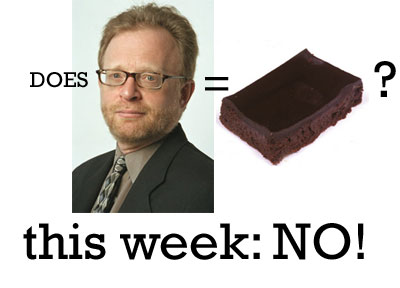May 22, 2005
Tanenhaus Watch: May 22, 2005

WEEKLY QUESTION: Will this week's NYTBR reflect today's literary and publishing climate? Or will editor Sam Tanenhaus demonstrate yet again that the NYTBR is irrelevant to today's needs? If the former, a tasty brownie will be sent to Mr. Tanenhaus' office. If the latter, the brownie will be denied.
When I saw this week's cover with the NASCAR photo, I felt a sharp pain in my solar plexus. And it wasn't just because Tanenhaus failed to capitalize all of the letters in NASCAR. (Yo, Sam, I'm about as uninterested in the Daytona 500 as the next guy, but even I know that NASCAR is an acronym for the National Association for Stock Car Auto Racing. This is about as absurd as referring to the Super Bowl as "the final Nfl matchup.") The NASCAR book comparison, written by Jonathan Miles, isn't a bad idea. But does it merit a cover review? Judging by the snide tone of Jonathan Miles' review, the review favors snotty defensiveness rather than a genuinely interesting (and, dare I say it, inviting) exploration of the subject. Rather than indoctrinating a reader unfamiliar with NASCAR about the appeal, Miles opts instead for a red state/blue state divisiveness that is becoming as deeply cloying in today's journalism as any reference to post-9/11 guilt, as if he genuinely believed that all blue staters equate watching the Daytona 500 with voting for Bush.
More egregiously, the "review," if it can be called that, spends half of its length bogged down in tired rhetroric and unfounded generalizations (the only literary detractor Miles can dig up is Tom Wolfe and the essay cited is from 1965) before finally getting to the two books in question. There are laughable comparisons to commuter traffic and not a single reference to the pit area (where people perform incredible overhauls and refueling on a car between laps; when have you seen that during rush hour?).
Eventually, things get a little interesting (if not book-specific) with a cursory overview of Curtis Turner's life. But not before Miles voices further contempt about NASCAR's potential future, equating it to Elvis dying on the toilet. If Miles had even bothered to do any research, a quick look at NASCAR demographics would have turne up the following for him:
- More than half of all NASCAR watchers earn between $30-75,000, a far cry from the NASCAR fans who "drive to the 7-Eleven to pick up a pack of smokes."
- 40.1% of all NASCAR fans have attended college.
- In fact, there isn't all that much in a disparity by region as the Southern picture painted by Miles. 38% of NASCAR fans are based in the South, but 35% of America lives into the house. 3% is hardly a figure substantial enough to invite stereotypes.
- Between 1999 and 2002, Hispanic and African-American audiences for NASCAR have notably increased. Hispanics went from 3.6% to 8.6% of the fan base while African-Americans went from 4.9% to 9.1% of the fan base.
For wasting his space on such stereotypical assaults, encouraging such lazy generalizations, and blowing an opportunity to represent an area of publishing that might be of interest to the NYTBR's readers, there can be no other recourse than the Brownie Bitchslap Factor.
BROWNIE BITCHSLAP FACTOR: Two and a half pages devoted to this nonsense? What were you thinking, Sam? SLAP! (Minus 1.2 points)
THE COLUMN-INCH TEST:
Fiction Reviews: Six half-page reviews, two one-page reviews, a one-page Crime roundup, a one-page Fiction Chronicle. (Total books: 16. Total pages: 7.)
Non-Fiction Reviews: One 2.5 page review, one two-page review (Hitch, go figure), seven one-page reviews, four half-page reviews. (Total books: 14. Total page: 13.5 pages.)
No surprise. This is Tanenhaus on autopilot. With nonfiction coverage dwarfing fiction at an almost 2:1 ratio, this is disgraceful. Half-page reviews of today's fiction, with the only one-page reviews going to Chuck P (who, with all his press, may as well be relegated to a half-page review) and Ann Beattie. 34% doesn't cut it, Sam.
Brownie Point: DENIED!
THE HARD-ON TEST:
This test concerns the ratio of male to female writers writing for the NYTBR.
Thirteen male reviewers (with two of them getting at least two pages), with a mere ten female reviewers, most of them kept cooking and cleaning with thankless fiction blurbs.
This is a remarkable slip from last week and one that deserves zero tolerance.
Brownie Point: DENIED!
THE QUIRKY PAIR-UP TEST:
Now this, I must say is a nice move: Francine Prose weighs in on the overhyped Oh the Glory Of It All. Even if there is a typo on the web version's headline, Prose is relatively fair on the book's merits while getting in a playfully sarcastic opening paragaph.
Christopher Hitchens takes The John Hopkins Guide to Liteary Theory and Criticism to task for its obfuscatory stance on the language to be found in literary criticism.
Unfortunately, all this is thrown to the well when one considers the Walter Kirn's review of Everything Bad is Good for You, or rather the way that Kirn has, in his work for the NYTBR continually stopped short of making a compelling and thoughtful point. Instead of explaining why Steven Johnson's argument is persuasive to him (despite being empirical), Kirn makes the mistake of making Johnson's claims more dubious and throwing in two references to Kojak to boot.
But the quirky mix is remotely interesting to get by.
Brownie Point: EARNED!
CONTENT CONCERNS:
[The NYT site is down this afternoon. I'll weigh in on this later.]
CONCLUSIONS:
Brownie Points Denied: 2
Brownie Points Earned: 1
Brownie Bitchslap Factor: -1.2 points
TOTAL BROWNIE POINTS REQUIRED FOR BROWNIE DELIVERY: 2
TOTAL BROWNIE POINTS EARNED: -.2 points

Well, it's hard to compete with nezy's particularly pungent expression of distate, but I agree: that Jonathan Miles piece was about as appallingly bad as things are likely to get over there.
Posted by: BT at May 23, 2005 07:50 PM